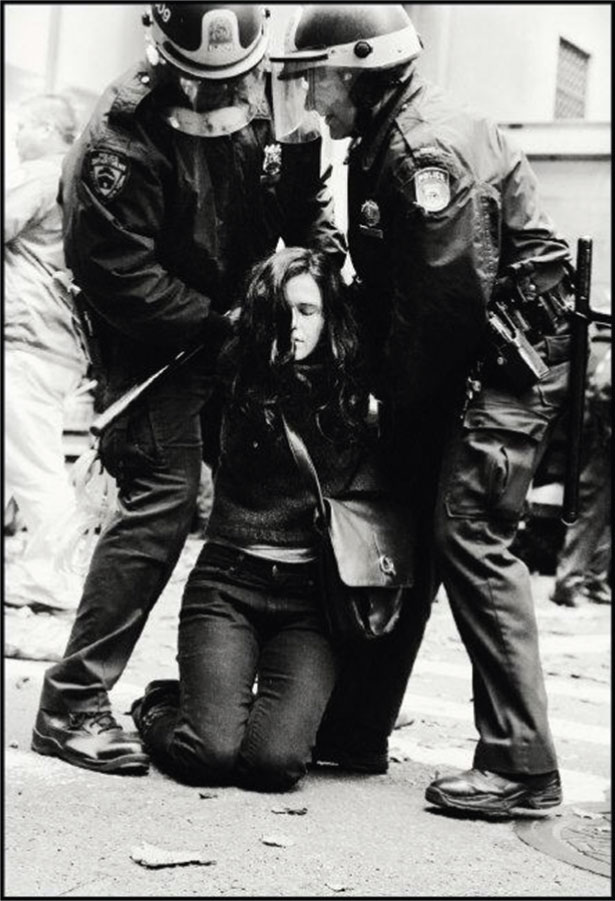
© Christopher Anderson/Magnum Photos. New York City, November 17, 2011
Wall Street is said to be fueled by the twin passions of greed and fear. That’s true enough, but not the whole story. There’s also a credo, a conviction, that all the deals and emotions add up to a surge of general bounty. In a metamorphic miracle, greed and fear conjure up growth and prosperity. The hordes of lower Manhattan partake of that conviction in fevers of exhilaration and panic. Their utopian aroma fills the nostrils of the famous bronze bull that charges triumphantly just south of Wall Street.
Wall Street’s utopia traffics in dreams. It’s a golden promise that, when everyone acts as a rational actor who buys and sells on the basis of information, the market knows best. Willy-nilly, it allocates capital to investments that seem to offer the best outcome. It’s a universal brain with an invisible heart. The zillions of private transactions are magically transformed into a dynamo of unfathomable proportions. Wall Street generates thrills—Maserati thrills, cocaine thrills, private-plane thrills, six-figure-vacation thrills, the thrill of seeing your name engraved in a university building or a hospital waiting room. These thrills celebrate a vision of Icarus not just flying close to the sun but landing on his feet, too.
Videos by VICE
Wall Street’s utopia is not only Wall Street’s, of course. It spills out everywhere. It’s unbounded and global. Globalization is a pale name for the promised uniting of humankind, where everyone speaks the common language of cost-benefit numbers. This utopia erases national boundaries. Race, gender, sexuality, and religion don’t matter. A buck is a buck. Everywhere, therefore, Wall Street converts reason into prosperity, which is, after all, a proof of moral excellence. The winners do well, but also good. Harnessing information, they deliver the common bounty. They are Investors Without Borders, one-worlders with a universal passion.
And there’s more. Since everyone’s dollar is equal to everyone else’s, this utopia is, in the end, egalitarian…
Well, there’s the snag, isn’t it? Some people have vastly more dollars than others. It takes some to get more. It takes a lot to get a lot more. The plutocrats move their dollars around in order to buy their way into privilege and pyramid their privilege from generation to generation. One thing they do with their bounty is arrange the laws to maintain their advantages. They buy preferences—exclusive safety nets. So the wealth that piles up is, to put it mildly, grotesquely unequal. Thus the parable of the 1 percent vs. the 99 percent, of which we heard so much three years ago.
For all its deficiencies of method and theory, Occupy Wall Street understood that you need a counter-utopia to resist a spurious utopia. Occupy, while it lasted, wanted to be, or was, that counter-utopia—for those who had the time, the youth, the unemployment, or the passion to hang out on the granite half acre of Zuccotti Park. For a couple of months, the occupation offered those with sufficient inclination, chutzpah, articulateness, and/or willingness to suffer discomfort a more or less self-governing, horizontal community—one without leaders, without grotesque discrepancies in property, acting according to no rules other than those the encampment devised. To some, it felt like paradise. To others, it felt like a cult.
But one way or another, however grand Occupy’s ambition, the denizens of Zuccotti Park could not come close to matching the reach of Wall Street in the collective imagination. They demanded too much of too few. Class, race, and gender resentments brewed. The absence of collective demands meant the presence of chaos. Drummers despised being told what to do and pissed off sympathetic neighbors. Occupy worked until too many separate styles and clamors offended too many fellow Occupiers and the police crushed the First Amendment.
Still, it’s too simple to argue that the dispersal of Occupy Wall Street proved there was a police state in action. There was brutality aplenty, but it was equally problematic that, though the Occupiers said they were working for the universal good (or 99 percent of it, anyway), they were actually exclusive—a community gated away not only by police barricades but by a spirit of We Precious Few.
The tragedy of the present political moment lies not only in the existence of Wall Street’s alluring and delusional utopia but also in the nonexistence of a shared counter-vision. Or shall we say the not-yet-existence? Everywhere, after all, there are struggles against abusive power. Optimists look at the sum total of all the local fights against despoilers of the land and arrogances of wealth, and they see fragments of the counter-vision. Some—I’m inclined to be one—see a counter-vision waiting in the wings of the growing climate movement.
What Occupy Wall Street taught us is that you don’t bring splinters to fight a grand vision. You need a spirit just as plausible and, at the same time, equally ambitious. Because the collective imagination has failed to produce an ideal nearly as stirring as Wall Street’s utopia, the bull—with all its charm and menace—charges on.
Follow Todd Gitlin on Twitter.




